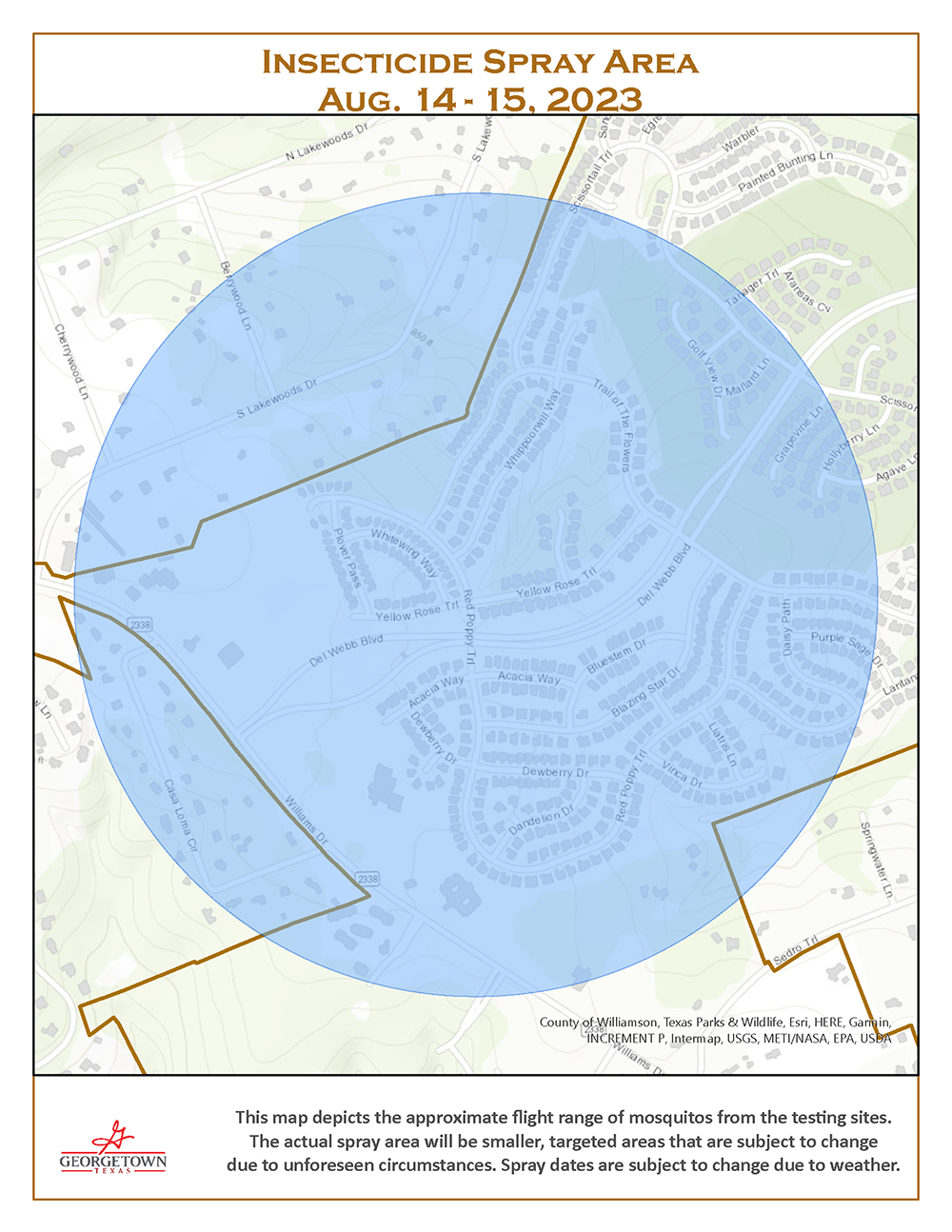Mosquito trap tests positive for West Nile virus in Georgetown
Ground spraying scheduled Aug. 14-15 in Sun City
The City will conduct truck-mounted spraying on the evenings of Aug. 14 and 15, weather permitting, in the area shown on the map based on a positive West Nile virus mosquito sample that was collected Aug. 8 from a trap site on the Yellow Rose Trail in Sun City. Although the mosquito control product poses no significant health risk, if possible, people and pets may want to stay indoors during spraying.
Since the Williamson County and Cities Health District began this year’s testing in May, 13 mosquito samples have tested positive for West Nile virus. No human cases have been reported in Williamson County to date.
The positive sample was collected from a trap site near Yellow Rose Trail in Sun City. The last time a positive sample was collected from this location was in August 2020.
“Given the frequent and persistent positive tests in Williamson County, and the amount of vulnerable population who live in Sun City, the Health District is recommending Georgetown conduct adult mosquito control to prevent human infection,” Jason Fritz, Integrated Vector Management Program Lead, said.
Spraying Aug. 14-15 in Sun City
The City is following the Health District’s best practices for Integrated Mosquito Management which, at their recommendation, calls for truck-mounted spraying, along with enhanced monitoring and testing and increased public outreach and education. Enhanced mosquito control efforts will also continue with the treatment of standing water with larvicide.
A map is included showing the areas where application of the pyrethrin-based insecticide is planned in the overnight hours Aug. 14-15. The use of the insecticide will reduce the adult mosquito population in that area. Spraying will be done if the wind speed is less than 10 mph.
What you can do
The most important way to prevent West Nile virus is to reduce the number of mosquitoes where people live, work, and play. Health officials strongly encourage everyone to remain vigilant about protecting themselves from mosquito bites and preventing mosquito breeding on their personal property. Mosquitoes breed in standing water, needing as little as one teaspoon. By draining all sources of standing water in and around your property, you reduce the number of places mosquitoes can lay their eggs and breed.
Eliminating places where mosquitoes can breed and reducing the chances of mosquito bites are the most effective lines of defense against exposure to West Nile virus. As part of its Fight the Bite campaign the Health District recommends:
- Draining standing water in flowerpots, pet dishes, clogged gutters, irrigation valve boxes, water meter boxes, and any drainage inlets. Even very small amounts of standing water can be a harborage for mosquitos to breed. See this homeowner checklist for a list of actions you can take.
- Using an EPA-registered insect repellent.
- Dressing in long sleeves and pants when outdoors.
- Treating standing water with EPA-approved larvicides that are available for retail purchase. Larvicides are products used to kill immature mosquitoes before they become adults. Larvicides are applied directly to water sources that hold mosquito eggs, larvae, or pupae. When used consistently, larvicides can help reduce the overall mosquito burden by limiting the number of mosquitoes that are produced, according to the Centers for Disease Control and Prevention (CDC).
For more information, go to the WCCHD website or visit the Texas Department of State Health Services West Nile website at txwestnile.org.










